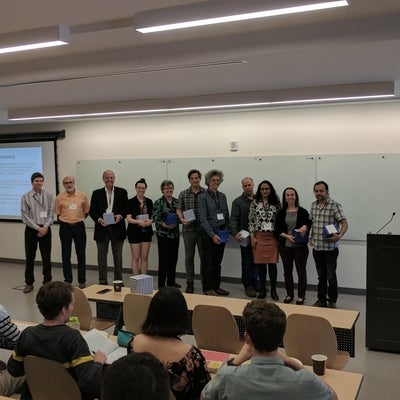
Join us on May 16 and 17, 2017 at Waterloo Institute for Complexity & Innovation’s (WICI’s) spring conference.
Hosted by the Waterloo Institute for Complexity and Innovation with support from the Field’s Institute for Mathematical Sciences and the Canadian Applied and Industrial Mathematics Society.
The resilience of complex systems to disturbances is a topic of longstanding and continuing interest in academic communities including applied mathematics, ecology, environmental sciences, and the social sciences and humanities, among others. Over the past few decades this research has led to both insights into real-world systems as well as policy improvements. However, significant theoretical and empirical challenges remain, as well as challenges in improving policy. This is particularly urgent for environmental systems where human influence is pervasive. This conference will bring together researchers and scholars interested in resilience in complex systems, with a special emphasis on natural, human, and coupled natural-and-human systems. The objective is to advance the field by bringing together individuals trained in disparate disciplines working on both qualitative and quantitative approaches, so they can benefit from interdisciplinary conversations. This conference will thereby deepen our understanding of resilience and help identify priority areas for future research.

The conference will include a plenary talk (Alan Hastings, Distinguished Professor of Environmental Science and Policy at the University of California, Davis), eight invited talks, parallel contributed talk sessions, a poster session, and a graduate student workshop (see below). Awards will be given out for best student poster and best student contributed talk
Invited speakers:
- Ann Kinzig, Arizona State University: "Extending resilience beyond small-scale natural resource systems: A help or a hindrance for human well being?"
- Vanessa Schweizer, University of Waterloo: "Investigating resilience and transformabiity in human systems"
- Kevin McCann, University of Guelph
- Bridie McGreavy, University of Maine
- Mark Constas, Cornell University: "Resilience and the measurement of recovery in development settings"
- Philip Beesley, University of Waterloo: "New sentient architechture"
- Simron Singh, University of Waterloo: "System collapse, tipping points and complex disasters: Nicobar Islands in the aftermath of the 2004 tsunami"
- Matthew Bonds, Harvard University: "Ecology of poverty, disease, and health care delivery: A new model district in Madagascar"
For further details on scientific program, contact: Chris Bauch (cbauch@uwaterloo.ca) or Madhur Anand (manand@uoguelph.ca). For further details on conference organization, contact: Noelle Hakim-Valeriote (noelle.valeriote-hakim@uwaterloo.ca).
Graduate Student Workshop
Transdisciplinarity in Resilience Research: Formulating Diverse Conceptions of Complex Systems
May 17, 2017 at 2:30 p.m. – 6:15 p.m.
University of Waterloo, KI Studio (Environment 2 room 2069)
Resilience is a term that is applied across diverse fields such as restoration ecology and community health. However, this does not mean that we have developed universal means of defining, characterizing, measuring, and monitoring systems resilience and risks. Given the normality of interconnection between social and ecological factors in complex systems, the advancement of transdisciplinary approaches to resilience planning would seem appropriate. In this workshop, participants will collaborate, using case scenarios, to develop integrated concepts, methodologies, and frameworks for grappling with resilience challenges. The workshop will provide participants with an opportunity to share their perspectives on the future of resilience research, while also gaining insights from others on techniques for systems analyses. The workshop is being organized by and for graduate students, and will be guided by Professor Vanessa Schweizer (University of Waterloo). Please note that workshop outcomes will be documented for research purposes and summarized in a short paper. Further information on the study taking place in accompaniment to the conference will follow via email, upon your registration. To register for the workshop, please email Kat Fair.
What is Life?
Socio-Ecological Resilience and Sustainability as Complex Adaptive Processes
With PhD candidate, Perin Ruttonsha
May 17, 2017 at 1:30 p.m. – 2:30 p.m.
Room SJ2- 2001
Resilience literature indicates that socio-ecological systems can oscillate through multiple states of equilibrium. What this implies, is that sustainability and resilience are not static end points, rather, are contingent on various, interdependent, dynamic factors. From the perspective of transition, we could say the context for transformation, itself, changes, and the means by which we pursue related goals should account for the circumstances in which they are implemented. Accepting that socio-ecological systems states can fluctuate widens the array of possibilities for sustainable and resilient futures. It also opens the boundaries of tolerance for diversity, conditions that deviate from standard expectations, or socio-political tensions that may emerge along the way. This workshop is grounded in ideas from complexity, systems, sustainability, and resilience discourses, which suggest that process-oriented, relational approaches are imperative when planning for transition.
From recent research on anthropogenic change, we might also gather that sustainability and resilience dilemmas arise primarily from human-in-environment interactions. Some resilience scholars have adopted the concept of ‘dwelling’ to characterize these relationships, and discuss the tacit or embodied connections that exist between people and their inhabited ecosystems. In this workshop, we will engage in an exercise of coarse-grained transdisciplinary scoping, to dissect the contents of ‘dwelling’, or human-in-environment interactions, as a distillation of basic human life routines. Doing so could lend clarification to the ‘wickedness’ of sustainability and resilience challenges, considering why and how social complexification has become strangely discontinuous from other biosphere processes. As an entry point, we will adopt the classic question posed by Schrödinger (1967[1944]), “What is life?”, along with Capra’s (2002) extension, “What are the defining characteristics of social reality?”(p.3), to formulate the broadest possible interpretation of the complex socio-ecological dynamics that exemplify transition problem spaces. To reserve a space in this workshop, please email pruttonsha@uwaterloo.ca.



